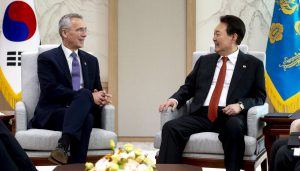The Diplomat author Mercy Kuo regularly engages subject-matter experts, policy practitioners, and strategic thinkers across the globe for their diverse insights into U.S. Asia policy. This conversation with Dr. Soo Kim, policy practice lead at LMI and former analyst at the U.S. Central Intelligence Agency, is the 356th in “The Trans-Pacific View Insight Series.”
Analyze Seoul’s response to NATO Chief Jens Stoltenberg’s request for South Korea to provide military support to Ukraine.
South Korea is still sitting on the sidelines of the Russia-Ukraine war. While NATO wants Seoul to step up and provide direct military aid to Ukraine, the South Korean government is exercising restraint due to its sensitivities toward potential backlash from Russia, China, and North Korea.
Seoul’s support to Ukraine falls far short of what NATO and like-minded democratic countries would like to see. The Yoon administration has provided humanitarian aid to Ukraine, which, while a gracious gesture, fails to alleviate Ukraine’s true pain points in the war.
The South Korea-Poland arms deal could be Seoul’s best and boldest effort yet to provide military assistance to Ukraine, via a third party. The international community applauds these gestures, but the roundabout nature of Seoul’s contributions casts doubts about its willingness to truly step up as a global pivotal state.
Examine Seoul’s strategic calculus in more closely aligning with NATO while managing relations with China and North Korea.
Seoul, deep down, must know by now that persuading China to support its interests on North Korea is a lost cause. Maintaining “neutrality” does little to ultimately sway Beijing towards Seoul’s position vis-à-vis the Kim regime’s hostility and nuclear weapons threat. Perhaps Seoul is holding onto that very slim, almost remote chance of Beijing coming around to cooperate with Washington and Seoul over the North Korea issue. Beijing’s actions to date, however, give very little confidence in such prospects.
If anything, this ambiguity and hesitation to take a stand either way most likely undermines Seoul’s position and reliability to both NATO and the China-North Korea partnership.
Evaluate President Yoon’s leadership skills in strategically positioning South Korea as geopolitical stakes are rising vis-à-vis U.S.-China tensions and Russia’s war on Ukraine.
Yoon has set out to make South Korea a “global pivotal state,” yet Seoul’s equivocal stance on consequential issues such as the Russia-Ukraine war casts doubts about the country’s readiness and capacity to truly live up to this ambition. There is recognition that South Korea, by virtue of its rapid economic development and growing prominence on the international stage, possesses the potential to make greater, more substantial contributions to global challenges. Seoul, however, does not appear to be fully maximizing this potential to further advance South Korea’s stature as a country capable of making tough decisions that may irk its adversaries – yet also strengthen Seoul’s international image, enhance relations with like-minded countries, and signal to its adversaries that Seoul cannot be pushed around.
Does South Korea have the capacity and will to “punch above its weight” in great power rivalry?
Willpower is key. Seoul may possess the capacity to punch above its weight; without willpower, however, it will not be able to take that bold step to swing and demonstrate its capability as a pivotal state. Concerns about North Korean retaliation and China’s coercion and unwillingness to support South Korean interests regarding the North Korean nuclear issue appear to loom largely over the Yoon administration’s decision-making. While Seoul’s concerns about the responses from its proximate neighbors are not trivial by any definition, its unwillingness to take an unequivocal stand on matters of global implication could undermine its image as a leading country.
Assess Washington’s expectations toward Seoul regarding South Korea’s relations with NATO.
Demonstrating solidarity against Russian aggression in Ukraine is not only helpful to the war; it also sends a resounding message to Seoul’s authoritarian neighbors – North Korea and China – that these acts of aggression will not be tolerated by the international community. As Seoul’s concerns about a growing North Korean nuclear threat and Chinese coercion rise, showing clear commitment to Ukraine will be an imperative to strengthening its own position against its not-so neighborly neighbors.

































